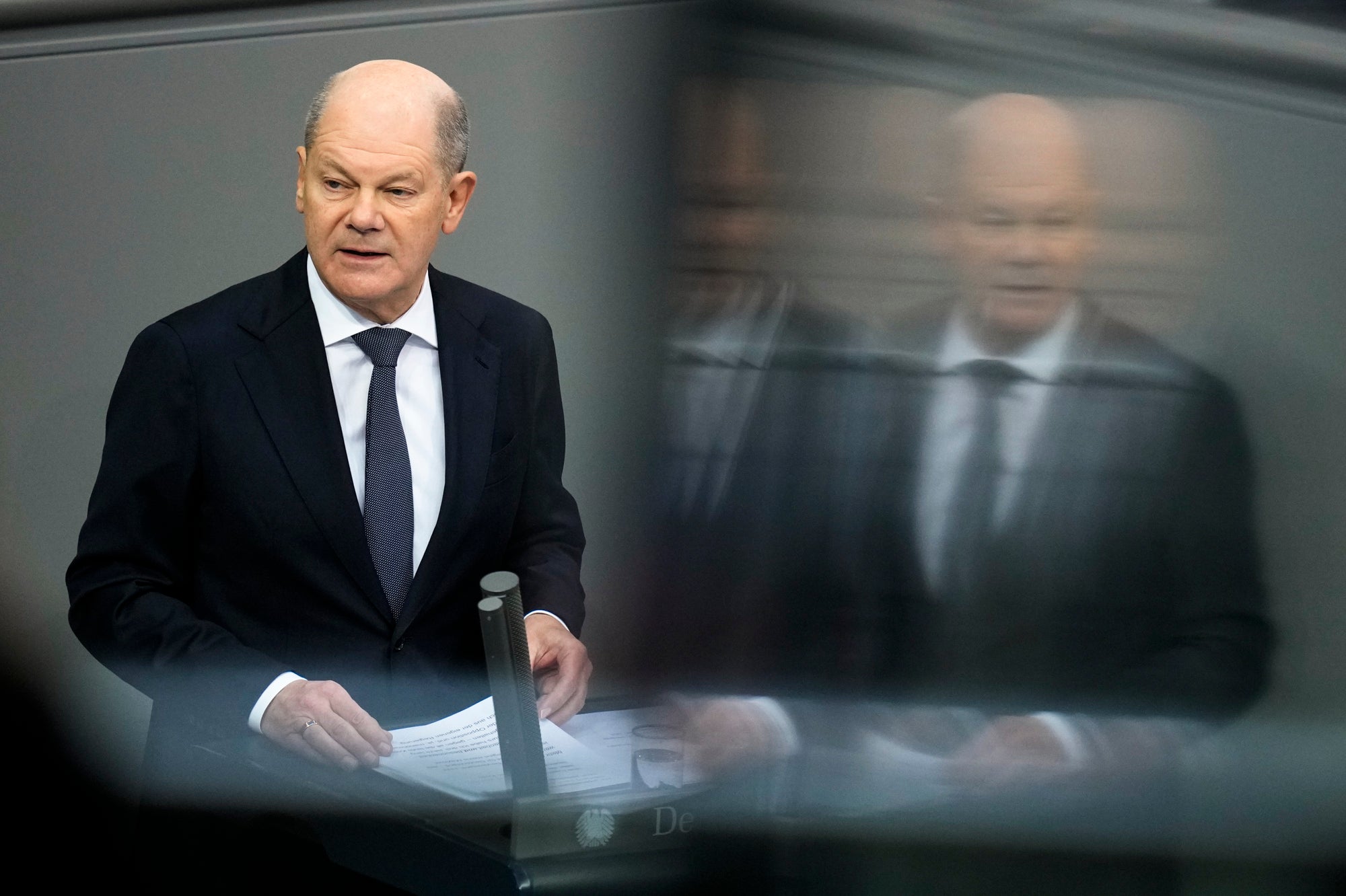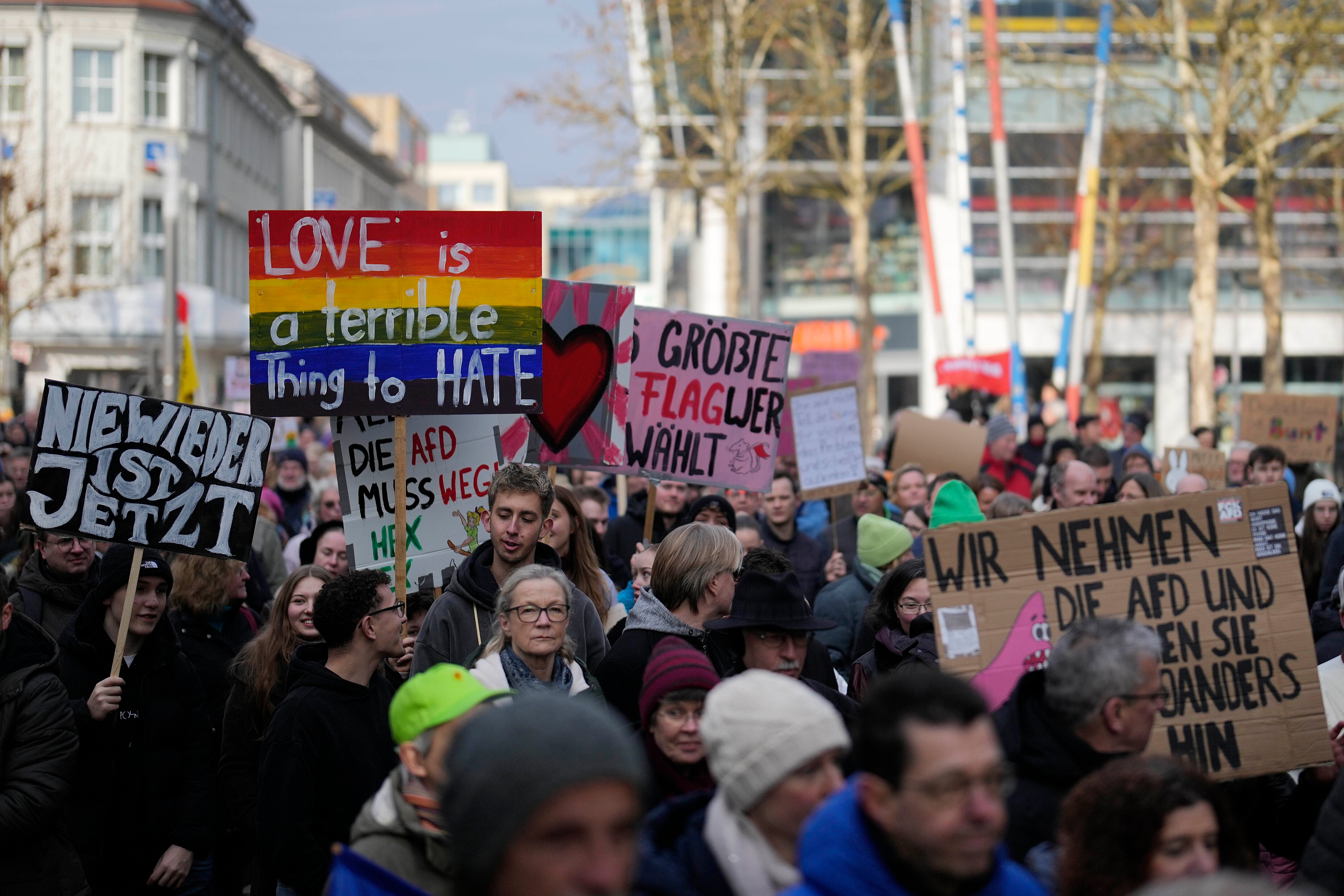Germany faces a snap election on 23 February following the collapse of Chancellor Olaf Scholz’s coalition authorities.
That has set the stage for a contest between established events and a surge of smaller contenders.
Voters will decide the nation’s trajectory amid a dynamic political local weather which has seen assist for the 2 main events erode in recent times.
Key points dominating the election embody the continuing struggle in Ukraine and a sequence of violent assaults elevating considerations about migration.
The re-election of US President Donald Trump and his relationship with Germany can even be on the entrance of voters’ minds.
This is a take a look at the principle contenders and the important thing points at stake:
Events
The 2 main events, Scholz’s centre-left Social Democrats (SPD) and the conservative alliance of the Christian Democrats (CDU) and Christian Social Union (CSU), have each seen their assist erode in recent times. This decline has opened the door for smaller events to achieve traction, together with the Greens and the far-right Different for Germany (AfD). All 4 of those events have put ahead candidates for the chancellorship.
Including to the complexity of the electoral subject are the pro-market Free Democrats (FDP), the far-left Linke, and the leftist Sahra Wagenknecht Alliance (BSW). Present polling suggests these events are teetering on the sting of the 5 per cent threshold required to safe seats in parliament, elevating the stakes for his or her campaigns.
The election end result will decide not solely the following chancellor but in addition the composition of the parliament and the potential for brand new political alliances.

Polls
The conservatives have been main nationwide polls for greater than two years and are at 29 per cent, in line with the most recent survey revealed by INSA on 8 February, adopted by the AfD at 21 per cent.
Scholz’s SPD, with 16 per cent, has dropped to 3rd from the primary place it achieved within the 2021 election. It’s adopted by the Greens on 12 per cent and the BSW on 6 per cent. The FDP is polling at 4 per cent and the Left is at 5 per cent.
Analysts say polls can shift rapidly as voters are much less loyal to events than they as soon as had been. Within the 2021 election marketing campaign, the conservatives went from frontrunner to runner-up inside a couple of months.
The conservatives’ chief, Friedrich Merz, specifically, is taken into account to be vulnerable to gaffes and fast to anger.
What are the important thing points?
Ukraine
Germany’s mainstream events all favour serving to Ukraine fend off Russia’s invasion, whereas the AfD and BSW need an finish to weapons deliveries to Kyiv and a resumption of excellent relations with Moscow.
Nonetheless, Scholz and his SPD have not too long ago struck a extra cautious tone – emphasising the necessity for diplomacy – than the conservatives, Greens and FDP, who’re all in favour of Germany delivering long-range Taurus missiles to Kyiv.
Reviving the economic system
Scholz has proposed incentivising non-public funding and modernising infrastructure with an off-budget, €100 billion fund. His SPD additionally plans a direct tax refund of 10 per cent on tools investments by companies.
The Greens’ Robert Habeck has, like Scholz, known as for reform of Germany’s constitutionally enshrined debt brake to permit for larger public spending.
Merz had additionally signalled some openness to a reasonable reform of the debt brake however his social gathering’s manifesto has pledged to retain it. The AfD and the FDP are fierce defenders of the restrict on public borrowing.
The CDU/CSU manifesto has proposed in depth monetary aid for corporations and residents, together with revenue and company tax cuts, and decrease electrical energy fees. They haven’t stated how these could be financed.
The AfD needs Germany to ditch the euro, reintroduce the Deutsche Mark and probably go away the EU.

Migration
A slew of violent assaults linked to international suspects in Germany have compounded public considerations over safety and migration, prompting political events to demand stricter measures on migration.
After the newest assault on 22 January, Merz sponsored a draft invoice with AfD assist, breaking a taboo in opposition to cooperating with the far-right social gathering.
Nonetheless, he later didn’t safe a majority for the invoice as among the deputies from his personal social gathering refused to assist it.
Typically, the conservative CDU has adopted a stricter stance on immigration in recent times, calling for pushing again asylum seekers on the borders, and for limits on household reunifications and naturalisation for refugees.
The anti-Islam, anti-migration AfD has known as for borders to be closed and asylum seekers to now not have the suitable to household reunification. Some senior AfD members have gone additional of their feedback and had been current at discussions amongst far-right activists about deporting hundreds of thousands of individuals of international origin, together with German residents.
The SPD itself has toughened its place by imposing stricter border controls and accelerating deportations, though it additionally needs to usher in extra international expert staff.
In distinction, the Greens preserve a extra open asylum coverage, selling state-backed sea rescue initiatives and simplifying household reunification processes and enhancing integration.
Power
Excessive vitality costs stay a formidable problem for households and companies in Germany and an necessary election marketing campaign subject.
The CDU, SPD and Greens agree on increasing renewable vitality to cut back prices however differ on financing approaches: the CDU suggests utilizing larger CO2 certificates revenues to decrease community charges, whereas the SPD and Greens assist debt-financed state subsidies. The CDU and AfD additionally suggest assessing a return to nuclear energy, an concept rejected by the SPD and Greens.
The AfD opposes renewable vitality subsidies solely, advocating unrestricted coal-fired energy plant operations and abolishing CO2 pricing to decrease client prices and improve vitality safety.
Relations with Trump
The query of methods to deal with the brand new administration of US President Donald Trump, who has already flagged the potential of elevated tariffs and lowered navy assist for Europe, is especially delicate for Germany. The US stays the highest vacation spot for German exports and its major safety ally.
The SPD’s Scholz has sharply countered Trump’s feedback on Greenland and Canada, whereas conservative frontrunner Merz warned in opposition to lecturing him, emphasising as a substitute areas of attainable cooperation like a possible EU-U.S. commerce deal or joint China technique.
The Greens’ Habeck stated the EU should stand united and search talks with the Trump administration as a result of a commerce struggle will in the end hurt all sides.
All the mainstream events have voiced scepticism about Trump’s demand for European international locations to extend spending on defence to five per cent of financial output, on condition that Germany will already battle to maintain to 2 per cent after its particular fund for the navy runs out. Habeck, nevertheless, has already proposed a rise to three.5 per cent.
The German social gathering that has most embraced the Trump administration is the AfD, which obtained a number of endorsements from Trump’s ally Elon Musk, leading to his dialog on X with the social gathering’s chancellor candidate Alice Weidel.
,
#dates #candidates #key #points #German #elections,
https://static.the-independent.com/2025/01/31/06/Germany_Election_92458.jpg?width=1200&top=800&crop=1200:800 ,



